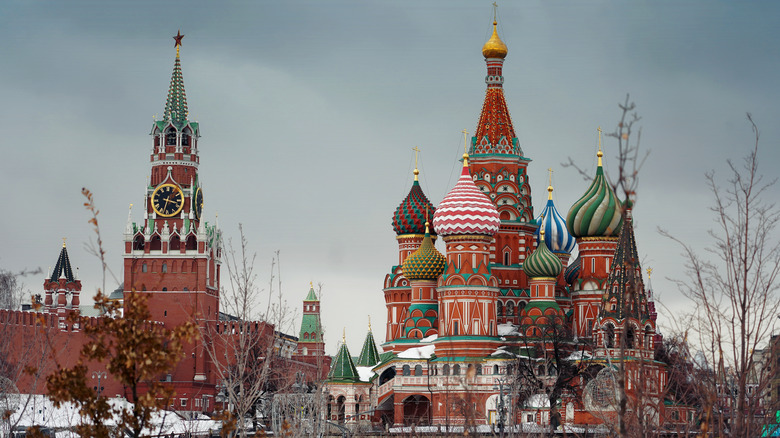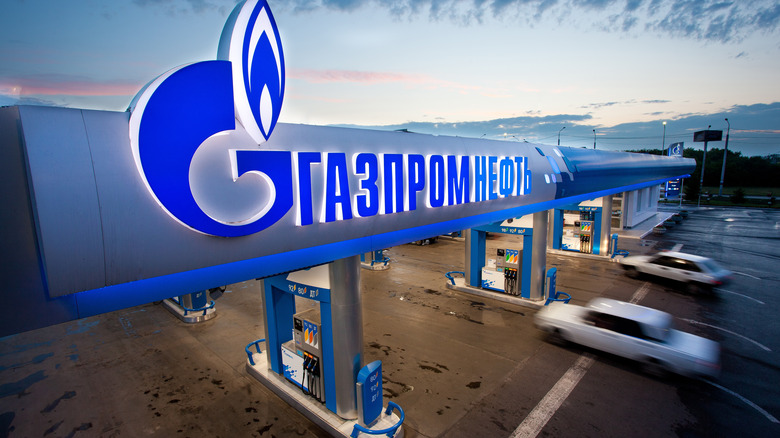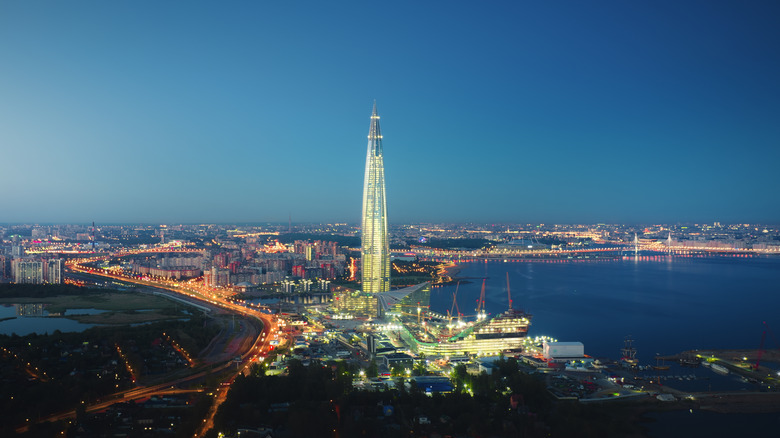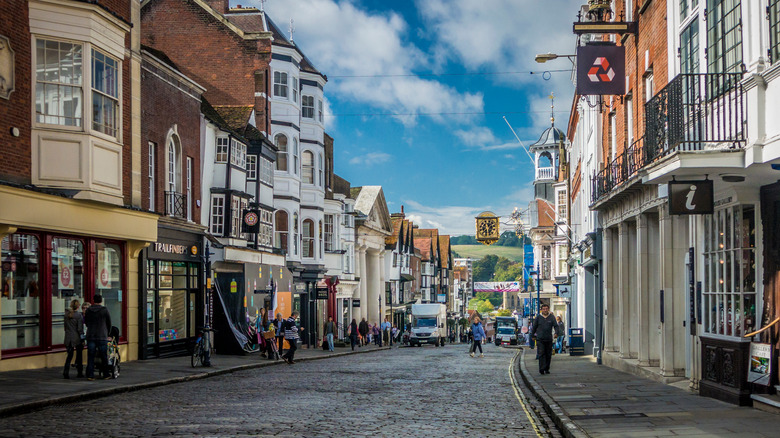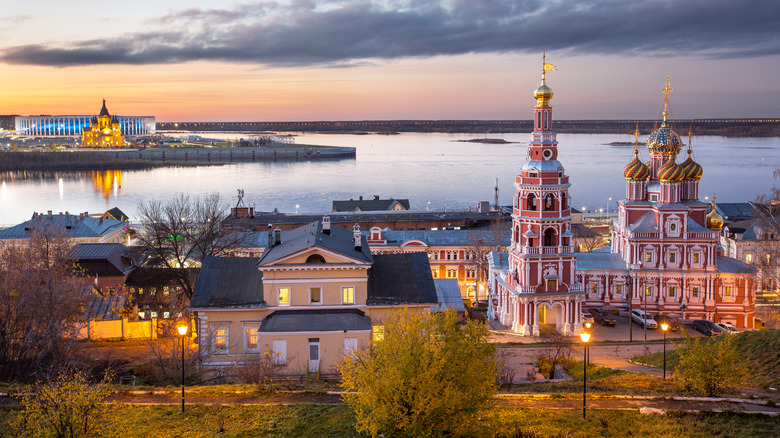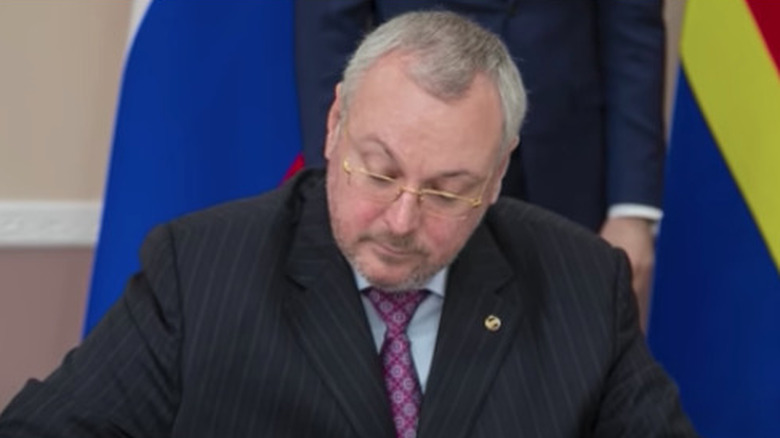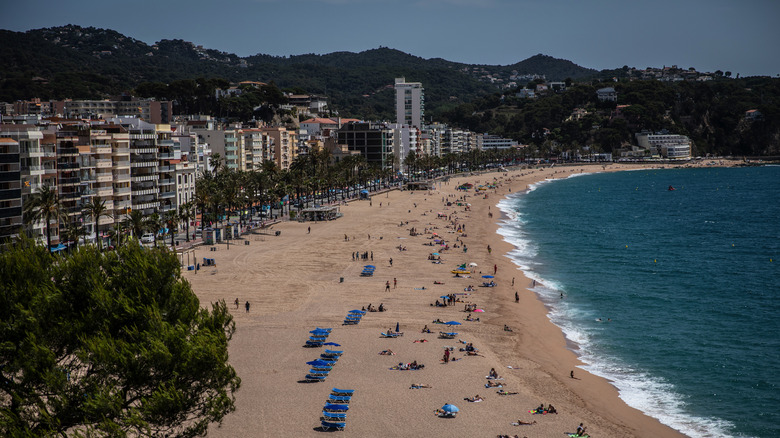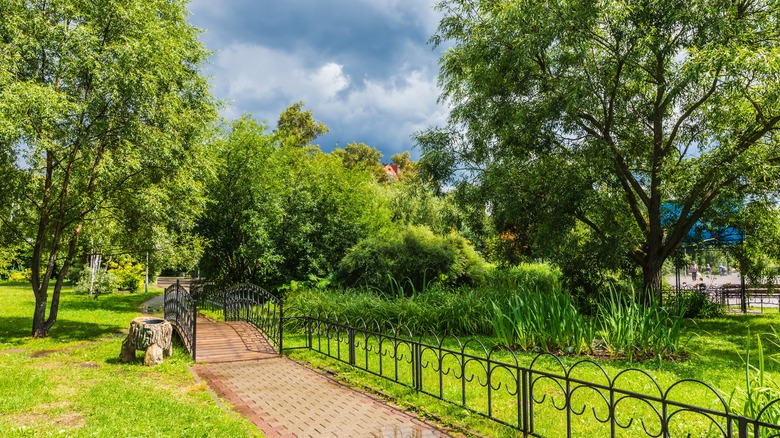Every Russian Oligarch To Die Since Russia's Invasion Of Ukraine
What are the odds that two prominent Russian oil and gas magnates with ties to the Kremlin are both found dead within 48 hours of each other? Oligarchs Vladislav Avayev and Sergey Protosenya both died in different parts of the world, but their cases are eerily similar: family members were also killed, the oligarchs have been blamed for those deaths, and the crimes have been chalked up to marital disputes, per The Daily Beast. It's hard not to draw a line back to the Kremlin considering Russia's track record with mysterious deaths. According to USA Today, there were 38 cases of unsolved murders and suspicious deaths between the years 2014 and 2017. The types of victims ran the gamut: journalists, politicians, diplomats, and businessmen. A common thread between a lot of them is their public criticism of Vladimir Putin or a private break-up with the Kremlin.
There's no evidence that the Kremlin is behind the recent deaths of six oligarchs, however. It's worth noting four of them were connected to Russian gas giant Gazprom, and all of them have died in the wake of Russia's invasion of Ukraine. According to the Warsaw Institute, two of these former Gazprom executives had in-depth knowledge of the company's finances, and it's possible their deaths were part of a cover-up. Because, when it comes to Russia, anything's possible.
Here is a running list of the oligarchs who have recently died.
Leonid Shulman
Leonid Shulman was among the first to die — nearly a month before Russia's invasion of Ukraine. He was the lead manager of Gazprom's Invest transport service, according to Fortune. At the end of 2021, he was investigated for fraud surrounding his upgrade of the company's vehicles by Gazprom's security agency, which is now investigating his death, per the Warsaw Institute.
He was found dead in the bathroom of his Leninskoye home, which is near St. Petersburg. He had stab wounds on his wrists, and a knife lay nearby. He lived in the same housing development compound as oligarch Alexander Tyulyakov, whose body was found weeks later. A suicide note left near Shulman's body spoke of pain in his broken leg, per the Warsaw Institute; he had broken his leg during the New Year and wore an Ilizarov apparatus to treat it, according to Russian newspaper Novaya Gazeta. The note was suspicious to investigators since Shulman should've been able to afford pain medication for his leg, and they suspect the fraud allegations brought against him were behind his suicide, instead.
Alexander Tyulyakov
On February 25, only a day after Russia invaded Ukraine, 61-year-old Alexander Tyulyakov was found hanging in his garage, per The Daily Beast. There was a suicide note near his body, but its contents are unknown. Gazprom's security agency arrived after the forensics team and prevented police from entering the site. They were described as a group of "strong guys" who drove in with Jeeps, per Novaya Gazeta. There were also reports from Russian news outlet Fontanka.ru that Tyulyakov appeared physically beaten prior to his death but with no explanation as to why (via Novaya Gazeta).
Tyulyakov was the Deputy General Director of Gazprom's Unified Settlement Center for Corporate Security. Tyulyakov was a 10-year veteran at Gazprom, having served other roles in the company's security and human resources departments, per Newsweek. To make things stranger, Tyulyakov lived near Leonid Shulman in a neighborhood where the minimum cost for a home is $500,000. The area is known as "Gazprom's nest" since many of its executives reside there, according to Russian news outlet 47News.
Mikhail Watford
On February 28, Ukrainian oligarch Mikhail Watford was found dead in his home in Surrey, England (pictured). The 66-year-old's body was found hanging by his gardener, per The Sunday Times. In the initial days of their investigation, Surrey police didn't consider his death suspicious, and he may have been driven to suicide after Russia's invasion of his homeland. But it's worth mentioning that Watford may have been at odds with the Kremlin. He was connected to disgraced oligarch Boris Berezovsky, who had an adversarial relationship with Putin and died under mysterious circumstances himself in 2013, per CNN. Putin worked to diminish the power of several oligarchs who were no longer loyal to him, and Watford may have been one of them.
Like many other oligarchs, Watford made his fortune in the oil and gas industries after the Soviet Union collapse. He moved to the U.K. in the early 2000s and changed his surname from Tolstoysheya to Watford. In England, he padded his fortune with real estate development and procured homes for the ultra-rich. He commissioned his own luxurious home on the famous Wentworth estate that later he placed on the market for £18 million, according to The Sunday Times. He had three children and was married to an Estonian interior designer.
Vasily Melnikov
On March 23, Vasily Melnikov was found dead alongside his wife and two sons. The family nanny found the bodies in Melnikov's Nizhny Novgorod apartment, per Russian newspaper Kommersant. All of them had died from stab wounds, and investigators suspect that Melnikov killed his family and then committed suicide. Neighbors disagree, however, since there were no signs of conflict in the family, and one neighbor said he never even heard Melnikov swear; the family had lived together in the apartment for five years, per Kommersant. Additionally, a family friend claimed they never fought. However, the police don't believe the deaths were caused by an outside perpetrator since there was no evidence of forced entry. The family appeared to have been asleep when they were killed, while Melnikov's body was found in a bathroom with a slit artery.
Unlike the other oligarchs on this list, Melnikov didn't work for Gazprom. Instead, he was the director of a medical firm called Medstom. According to Ukrainian news outlet Glavred, Medstom fell victim to western sanctions since it imported medical supplies to Russia, and some believe its subsequent hardships motivated his murder-suicide. Melnikov had also developed a sour relationship with a former business partner, and at one point, he had to hire security to protect himself. Regardless, Melnikov reportedly messaged one of his employees the day before his death with instructions to bury him near his mother.
Vladislav Avayev
On April 18, the bodies of former Gazprombank executive Vladislav Avayev — the ex-vice president of Gazprombank, which is considered the third largest bank in Russia – and his wife and daughter were found in their Moscow apartment. They were all killed by gunshot wounds, and investigators found several firearms at the scene, according to Kommersant. Avayev's 13-year-old daughter Maria had cerebral palsy and required assistance, but when her nanny attempted to enter the apartment, she couldn't. So she contacted the family driver, who then contacted Avayev's eldest daughter, after which they discovered the gruesome scene.
As for motives, according to the Warsaw Institute, Avayev's wife was impregnated by their driver and this made Avayev jealous. Further, last year, Avayev's wife Elena filed a lawsuit against him but later withdrew it, per Kommersant. Investigators believe that Avayev killed his family before he committed suicide, and because the door was locked from the inside, no one else could've gotten in. However, people who spoke to Avayev before his death claim he was in good spirits and wouldn't have killed his family.
Sergey Protosenya
On April 20 — only two days after the death of Vladislav Avayev – another oligarch and his family was killed. Sergey Protosenya and his wife and daughter were found dead in a rented villa in Lloret de Mar, Spain (pictured). They lived in France but were in Spain for the Easter holiday. Investigators believe that Protensenya murdered his family with an ax while they slept and then hanged himself in the villa's garden. He left behind a son in France, who alerted authorities after his mother failed to answer her phone, according to Spanish news outlet Telecinco. As with the other oligarchs on this list, there was nothing to suggest that Protensenya intended to kill himself or his family, and residents of Lloret de Mar noted nothing amiss about the family. Although Spanish investigators are inclined to name Protosenya the perpetrator, they are open to the idea that someone else was responsible and then staged the crime scene, per Radio Free Europe.
Protosenya was worth more than €400 million and was once vice president of Novatek, a Russian gas company, having worked there from 1997 to 2015. According to Radio Free Europe, Novatek is Russia's largest independent natural gas provider but recently paid a large price due to western sanctions. Still, in a public statement, the company paid tribute to Protosenya and refuted conspiracy theories surrounding his death, per Fortune.
Alexander Subbotin
Alexander Subbotin is the seventh oligarch to die this year. His body was found dead on May 8 in the home of a shaman, and Russian authorities have opened up a criminal investigation to look into the cause. The death occurred in Mytishchi, Russia (pictured), so the Mytishchi Ministry of Internal Affairs will handle the case, according to Russian media outlet TASS. According to a source for the publication, his body was found in a basement room regularly used for "Jamaican voodoo rituals." The shaman, who went by the name Magua but whose real name was Alexei Pindyurin, said that Subbotin had visited the day before while heavily intoxicated with drugs and alcohol. Local Russian news outlets have made unsubstantiated reports that he went to the shaman's home for a cure using toad poison, according to Newsweek. Pindyurin is known for offering a hangover remedy that involves dripping toad poison into a cut in the skin, according to Russian news site Mash (via CBS News). It also notes that Subbotin had sought treatment from Pindyurin before, per The Independent. Official reports say that Subbotin suffered a heart attack.
Subbotin once held a head management role at the Russian oil company Lukoil, which called for an end to Russia's war in Ukraine. Lukoil also owns 11 gas stations in the United States and was likely subjected to sanctions. Subbotin was later a board member of the company, per CBS News. Lukoil is Russia's second-largest oil provider, per Reuters.
